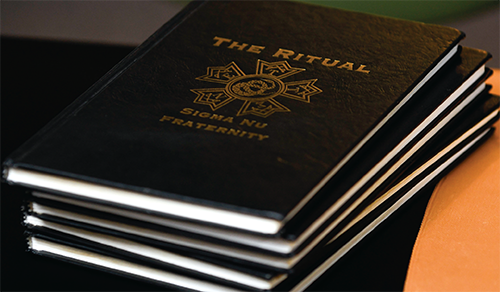Creating Change
As Ryan Gryder (Texas State) walked into the ballroom at the Hotel Roanoke for College of Chapters, he knew that a lot was riding on his ability to find the answers that he was seeking for his chapter. As a new Commander, Ryan felt his chapter was at a turning point. However, he didn’t know how to go about making the changes that were needed.
One of the things bothering him the most was how the chapter saw the use of The Ritual.
“It was not like we were not doing Ritual,” he says. “We were doing it, but the problem was the lack of seriousness about it.”
 As he thought about a recent interaction with alumnus Jerry Fields (Texas State), he remembered the advice that Jerry shared with the brothers at a chapter meeting. “Brother Fields came to the chapter meeting where I was being installed as Commander,” Ryan remembers. “He emphasized the importance of the cardinal principles of Sigma Nu and the use of Ritual. That night, we talked about how we can become better as a chapter. We realized if we changed the way we saw Ritual, we could use that as a foundation to improve other aspects of the chapter.”
As he thought about a recent interaction with alumnus Jerry Fields (Texas State), he remembered the advice that Jerry shared with the brothers at a chapter meeting. “Brother Fields came to the chapter meeting where I was being installed as Commander,” Ryan remembers. “He emphasized the importance of the cardinal principles of Sigma Nu and the use of Ritual. That night, we talked about how we can become better as a chapter. We realized if we changed the way we saw Ritual, we could use that as a foundation to improve other aspects of the chapter.”
College of Chapters gave Ryan an opportunity to see how Ritual was done correctly and with the level of respect it deserved.
“I saw the level of care and execution and I was able to directly compare it with how we do it here at Texas State. Instantly, I saw a lot of room for improvement. After taking in all the information, I evaluated where we were and where we needed to be.”
And that is how Ryan came up with the idea of Ritual practice. “It is a one-minute practice before the opening and closing of chapter,” he says. “I thought we could practice both in a chapter meeting.”
The changes made by Ryan and other officers did not start out easy. He received a lot of pushback. Some of his Executive Board members didn’t initially see the need to focus more on Ritual.
Jarrett Reed, the chapter’s Sentinel was one of them. “I didn’t really see the point in ritual practice at first. I thought I knew the Ritual well enough, but I didn’t take time to really learn them by heart or get a deeper understanding of the meaning behind the words.”
In fact, at the very first ritual practice a couple people were laughing. “But we didn’t care,” said Ryan undeterred. “We knew this was going to be great for the chapter.” The ritual practice in week two got a little bit better.
“Brothers were realizing, ‘Okay, we need to do this again, this practice thing.’ We stuck to our guns and kept on practicing during chapter meetings. By week three, the brothers were almost on the same page. They realized, as a chapter, we are going to do Ritual the right way and we are going to get there through practice. By week four, everyone was on the same page.”
The time finally arrived to put it all together at a chapter meeting, the last one before spring break. The hardest obstacle to get through in the practice had been the Greek and Latin pronunciation of specific lines. The chapter pronounced them flawlessly. “I looked up at their faces after that and I could see their eyes were a little wider,” Ryan recalled. “I could tell that they had never heard it done correctly before and we had just done it. Afterwards, their faces said it all. It gave me goosebumps. From that point on, the chapter was changed because of how well we did the Ritual. There was a new energy in the room. I thought to myself, this is very powerful.”
In reflecting on his College of Chapters experience, Ryan believes that much of his success as Commander is a result of what he learned there. “Everything that I had hoped to learn and find ideas for, I figured out at College of Chapters. Whether it was about how to run the chapter, delegate, or set goals. Most of the things that I learned correlated with my personal life as well. College of Chapters was a pivotal moment in my life.”